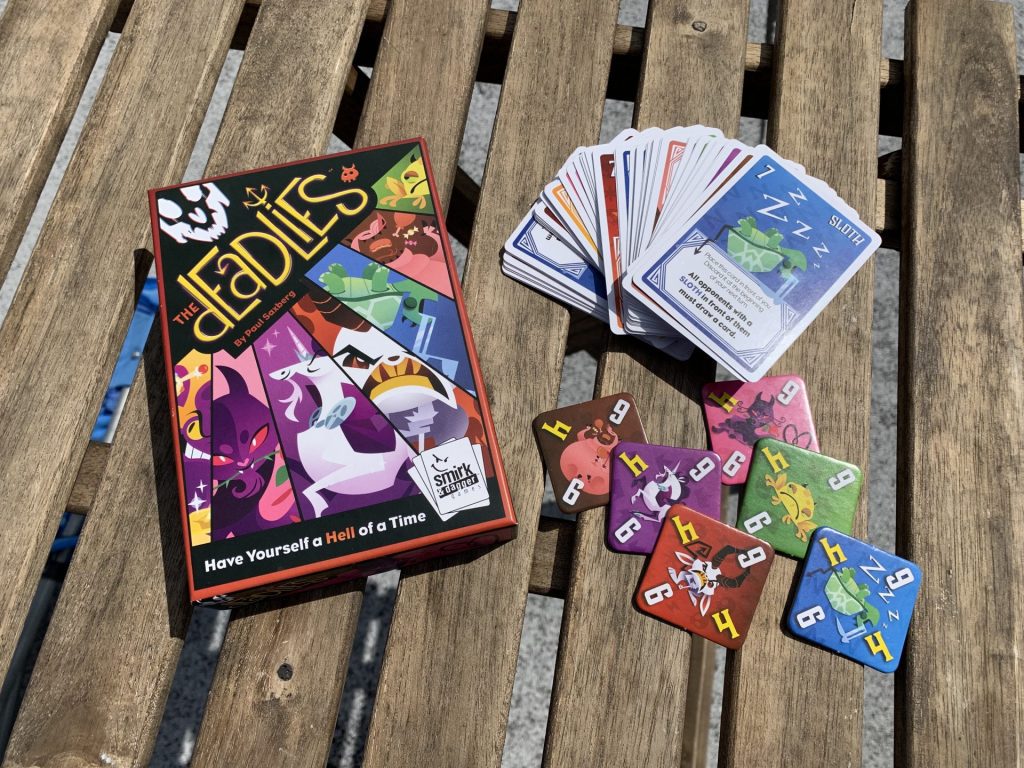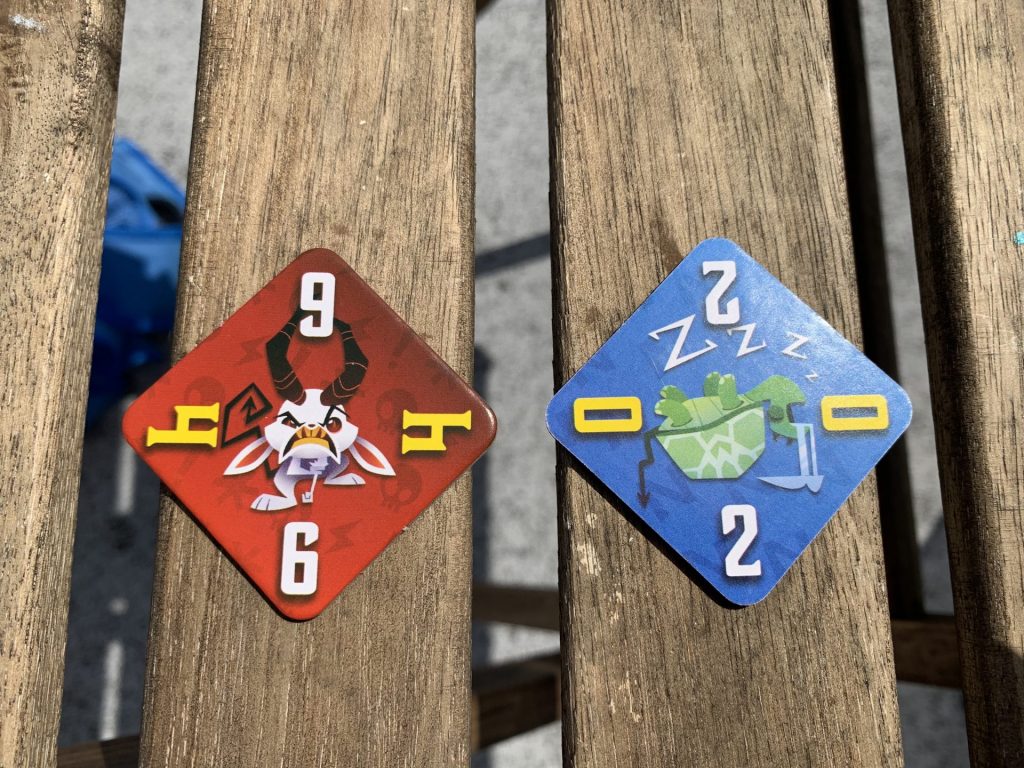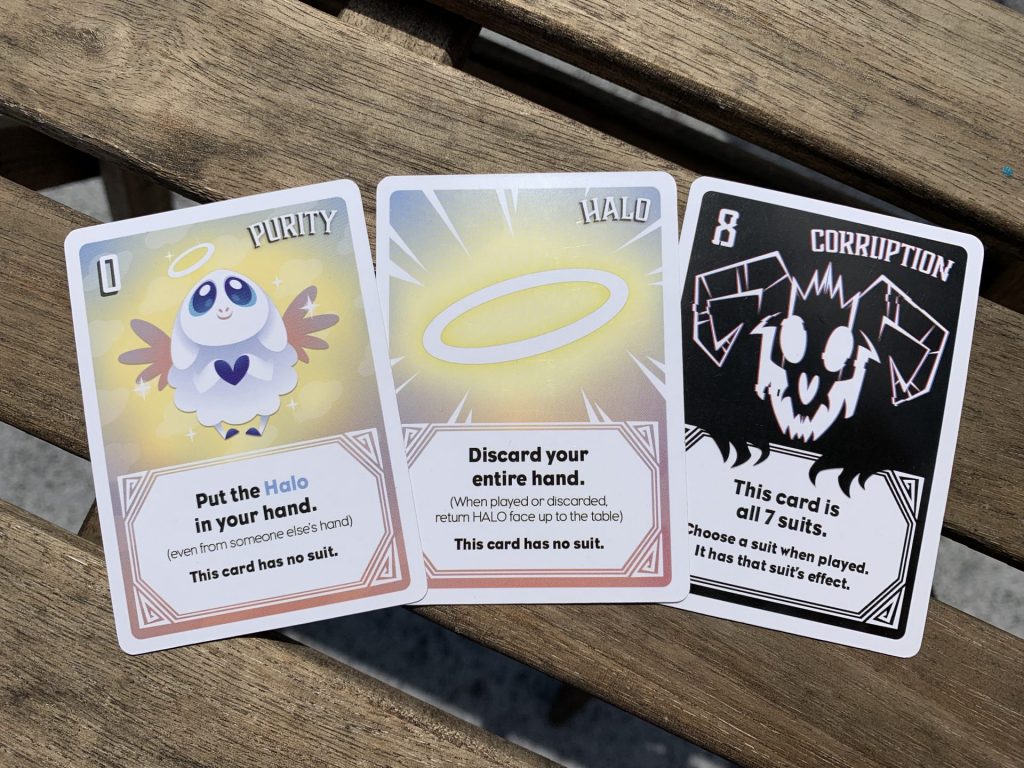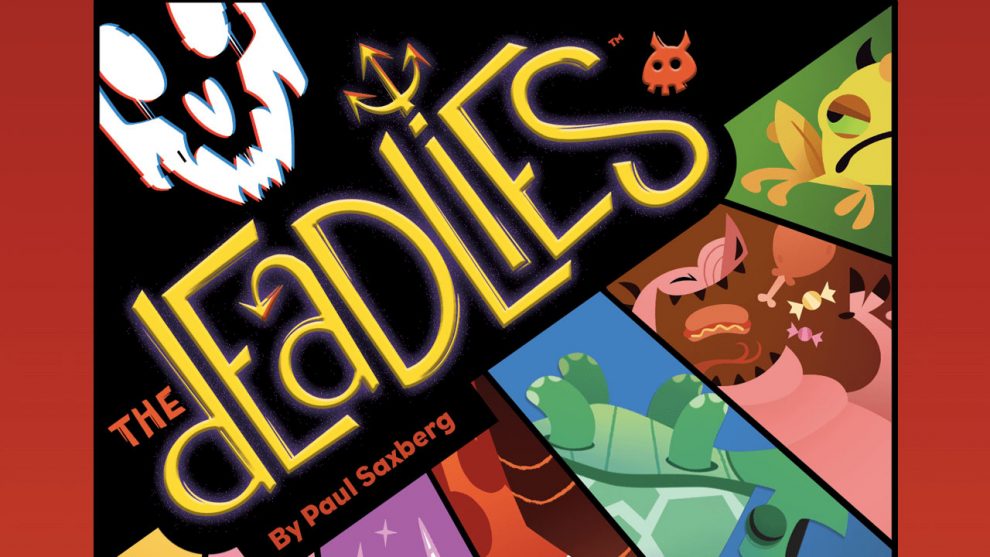Disclosure: Meeple Mountain received a free copy of this product in exchange for an honest, unbiased review. This review is not intended to be an endorsement.
i>The Deadlies, a card game for 3-5 players from designer Paul Saxberg and publisher Smirk & Dagger Games, challenges players to be the first to absolve themselves of their sins. You play cards in a race to empty your hand, using the abilities granted by the different suits—represented here by the seven deadly sins—to ambush your opponents. But be warned: sins are fickle, and just as likely to backfire as not.

Setup couldn’t be simpler. First, each player receives a double-sided Wickedness token to keep track of how many times they’ve emptied their hand. Then you place the Halo card in the middle of the table, shuffle the deck, and deal out six cards to each player. That’s it. The draw pile goes next to the Halo and you are ready to go.

You can play any number of cards on your turn, so long as they fall into one of three permitted groupings. You can play any amount of cards in the same suit, with the same number regardless of suit, or in a straight regardless of suit. Once your cards are played, the suit power activates. If you play a group of cards from the same suit, you use that suit’s power. If you play cards with a matching number, you choose which one of the played suits will apply. If you play a straight, the suit of the highest card will take effect. At the end of your turn, if your hand is empty once all the powers have resolved, you rotate your Wickedness token and draw the appropriate hand size.

John 3:4 – “Sin is lawlessness.”
Each of the seven sins does something different, and each requires its own little risk-reward calculation.
Envy forces you to draw two cards. If your hand is free of Envy after you’ve drawn, you can swap hands with someone else. This is great when another player has already worked themselves down to a small hand, or when someone has picked up the Halo from the table, which I’ll explain in a moment.
Gluttony compels you to either draw three cards from the deck or take one from another player, helping to reduce their hand size in the process. After doing so, you get to take another turn.
Greed is the most complex of the suits. You deal a minimum of two non-Greed cards from the top of the deck to the other players around the table. You can stop at any point, and if you do the other players take the cards in front of them into their hands. It may be in your interest to push your luck, though; if you manage to deal a total of five non-Greed cards without revealing two of the same suit, you get to immediately discard your entire hand. The risk is considerable; if at any point you deal a second card of the same suit, you take all of the cards you’ve dealt into your own hand.
When you play Lust, you choose another player, who then decides whether or not the two of you will each discard a card. This is a trust exercise; if either player then discards a Lust card, the other has to draw three.
When you play Pride, you ask another player “Do you have Pride?,” and if they don’t, they have to draw a card. If they do, you have to draw a card. In my play-throughs, this is the only suit players regularly found confusing. The goal of the game is to rid yourself of sin, so it doesn’t make thematic sense for players to be punished for not having Pride.
Sloth stays out in the middle of the table after being played. It is the only card that cannot possibly lead to you drawing any cards before the end of your turn, so it’s great to play when you empty your hand. The catch here is that your hand does not count as empty until the beginning of your next turn, when the Sloth is discarded from the center of the table. Until then, you will have to draw a card any time another player uses Sloth. It may well be that your hand is no longer empty by the time you get to discard it.
Wrath forces a player of your choice to draw two cards. Once they’ve drawn, they can discard a Wrath to force you to do the same. This cycle continues until one of you either runs out of Wrath or chooses not to retaliate.
In addition to the Sins, there are three special cards. Purity lets you pick up the Halo from the table and add it to your hand. The Halo lets you discard your entire hand immediately. Finally, there’s Corruption, a wild card that acts as all suits at all times and takes the effect of whichever suit you choose when played.

Proverbs 18:2 – “A fool takes no pleasure in understanding, but only in expressing his opinion.”
This is a simple, snappy card game, and I must say that I am impressed by how thematic its mechanisms are. Wrath begets more wrath. Gluttony forces you to take more, more, more, both cards and turns. Greed can bury you in possessions. Realizing the level of thematic integrity over the course of the first game was a real treat.
The ways in which the sins interact with your knowledge of other players’ hands is surprisingly rich. When someone plays Greed, you can see what cards everyone picks up, and adjust accordingly. There’s a pleasing amount of tension around the Halo, a card that would be overpowered in any number of lesser games. That the Halo is picked up from the table in full view of everyone means that everyone knows you have the Halo for a round before you can play it. That makes you a target for Gluttony and particularly for Envy. You see what I mean about the thematics.
Each time you succeed in playing all your cards, your hand size decreases by two. This gives the game a nice build in momentum as it goes along. The box says The Deadlies is for 3-5 players, with a variant setup for 6. I enjoyed my four-player games, but I don’t recommend three; because you’re always targeting the same two players, constantly forcing cards into their hands, the game overstays its welcome.
At four or five players, this is a fun, quick game that would work well for families. Kids will pick up the rules fairly quickly and parents will find some depth in the card play. Leah Fuhrman—uncredited on the box, which is a real shame—has created some wonderful art, steeped in the work of Craig McCracken and Genndy Tartakovsky, and the theme is fun. Part of me wishes it were a 10-minute game, and I’m tempted to try all players starting out with a hand of four instead of six. The shine started to come off after three or four plays, but it’s a good little game and there can never be too many of those. Besides, this is the only game I know where the winner ends up cleansed from all unrighteousness, and that’s got to count for something.












Add Comment